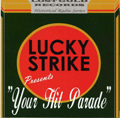Related Research Articles
The year 1958 in television involved some significant events. Below is a list of television-related events during 1958.
The year 1957 in television involved some significant events. Below is a list of television-related events during 1957.
The year 1953 in television involved some significant events. Below is a list of television-related events during 1953.
The year 1952 in television involved some significant events. Below is a list of television-related events during 1952.
The year 1948 in television involved some significant events. Below is a list of television-related events during 1948.
Mary Kay and Johnny is an American situation comedy starring real-life married couple Mary Kay and Johnny Stearns. It was the first sitcom broadcast on a television network in the United States. Mary Kay and Johnny initially aired live on the DuMont Television Network before moving to CBS and then NBC.

Your Show of Shows is a live 90-minute variety show that was broadcast weekly in the United States on NBC from February 25, 1950, through June 5, 1954, featuring Sid Caesar and Imogene Coca. Other featured performers were Carl Reiner, Howard Morris, Bill Hayes, baritone singer Jack Russell, Judy Johnson, the Hamilton Trio and the soprano Marguerite Piazza. José Ferrer made several guest appearances on the series.

Your Hit Parade was an American radio and television music program that was broadcast from 1935 to 1953 on radio, and seen from 1950 to 1959 on television. It was sponsored by American Tobacco's Lucky Strike cigarettes. During its 24-year run, the show had 19 orchestra leaders and 52 singers or groups. Many fans inaccurately referred to the show as The Hit Parade.
Betty Ann Grove was an American actress and singer.

Dennis James was an American television personality, philanthropist, and commercial spokesman. Until 1976, he had appeared on TV more times and for a longer period than any other television star. Alternately referred to as "The Dean of Game Show Hosts" and the "Godfather of Gameshows", he was the host of television's first network game show, the DuMont Network's Cash and Carry (1946).
America's Got Talent is a televised American talent show competition, and is part of the global Got Talent franchise created by Simon Cowell. The program is produced by Fremantle USA and Syco Entertainment, and broadcasts on the NBC television network. It premiered on June 21, 2006, after plans for a British edition in 2005 were suspended, following a dispute within the British broadcaster ITV. Production would later resume in 2007, following the success of the first season. Each season is mainly run during the network's summer schedule, and has featured various hosts over the course of the program's history. The current host is Terry Crews.
Celebrity Time was an American game and audience participation television series that was broadcast on ABC in 1949 - 1950 and on CBS in 1950 - 1952. The original host was Douglas Edwards.

James Clarence Wakely was an American actor, songwriter, country music vocalist, and one of the last singing cowboys. During the 1930s, 1940s and 1950s, he released records, appeared in several B-Western movies with most of the major studios, appeared on radio and television and even had his own series of comic books. His duet singles with Margaret Whiting from 1949 until 1951, produced a string of top seven hits, including 1949's number one hit on the US country chart and pop music chart, "Slippin' Around". Wakely owned two music publishing companies in later years, and performed at the Grand Ole Opry until shortly before his death.
Village Barn was the first country music program on American network television. Broadcast by NBC-TV from May 24, 1948–September 1949 and from January 16–May 29, 1950, the live weekly variety series originated from The Village Barn, a country music nightclub in New York City's Greenwich Village.
Public Prosecutor is an American television series produced in 1947–1948, which first aired in 1951.

We the People is an American talk show aired on CBS Television (1948-1949) and then on NBC Television (1949-1952).

The Martin and Lewis Show is a radio comedy-variety program in the United States starring the comedy duo Martin and Lewis, consisting of Dean Martin and Jerry Lewis. It was broadcast on the NBC Radio Network beginning April 3, 1949, and ending July 14, 1953.

Kay Kyser's Kollege of Musical Knowledge is an American old-time radio musical quiz program starring Kay Kyser. It was broadcast on Mutual, NBC, and ABC beginning on February 1, 1938, and ending on July 29, 1949.
Ruth Kyle MacDonnell was an American model, singer, and actress. She was featured as a "Television Ingenue" on the front page of Life magazine's May 31, 1948, issue.
References
- 1 2 3 4 5 6 7 8 Hyatt, Wesley (2015). Short-Lived Television Series, 1948-1978: Thirty Years of More Than 1,000 Flops. McFarland. p. 5. ISBN 9781476605159 . Retrieved November 13, 2019.
- 1 2 3 Brooks, Tim; Marsh, Earle F. (2009). The Complete Directory to Prime Time Network and Cable TV Shows, 1946-Present. Random House Publishing Group. p. 490. ISBN 9780307483201 . Retrieved November 13, 2019.
- ↑ Irvin, Richard (2018). The Early Shows: A Reference Guide to Network and Syndicated PrimeTime Television Series from 1944 to 1949. BearManor Media. Retrieved November 13, 2019.
- ↑ "For Your Pleasure" (PDF). Billboard. May 1, 1948. p. 11. Retrieved November 13, 2019.